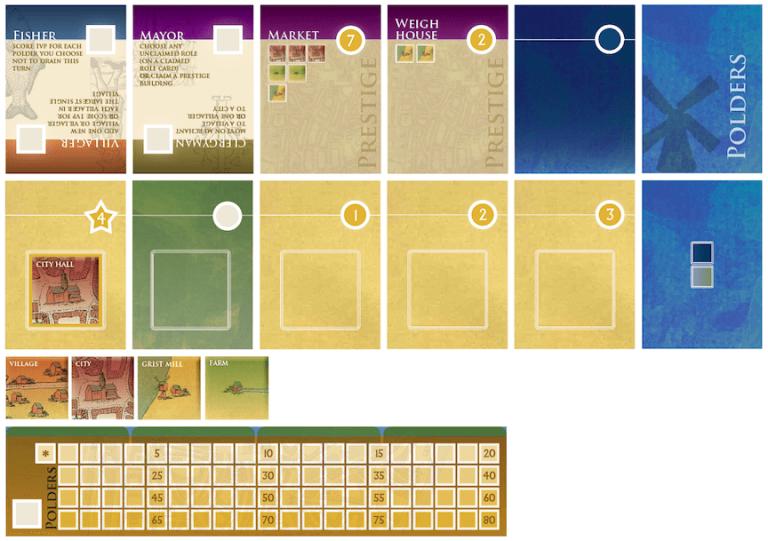Polders

Polders
For more than a millenia, the Netherlands has been constructing polders to reclaim land from the sea. Dikes are built and wind driven drainage mills pump the seawater out, leaving new usable land behind. Players drain water to create land and then settle farms, villages and cities, and build prestige buildings. The player who best develops their polders and gains the most victory points will win the game. Polders is a 2-4 player game lasting about 30 minutes.
Needed to Play:
• The deck of 76 cards
• 1 Starting Player token to keep track of who goes first each round
• 1 Role pawn, 1 Score Track and 1 Score Track Marker for each player in a matching color
• 2 sets of 35 double sided tiles used to designate mills, farms, villages and cities (called settlements) in the game
• 40 to 50 other people markers in one color, preferably black. These markers are used to designate mills, farmers, villagers and merchants in the game
Play: Each game round has 3 phases:
Phase 1 - Role Choice
Beginning with the start player, each player places their role pawn on one of the 5 double-sided Role cards, claiming 1 of the 2 roles on the card. Players can place pawns only on Role cards that do not have a pawn already on them.
Phase 2 - Polder Drainage
Beginning with the start player, each player, in turn, clockwise from the start player, may do only one of the following actions:
a. Place a new Polder card and Mill marker in their holding
b. Drain all Polders one level
Phase 3 - Development
Players place markers and score any victory points at this time, per role actions. Players may only place one type of settlement (Farm, Village or City) tile on any one Polder card. Players may never place a settlement tile on a card already developed as a Grist Mill. Prestige Buildings may be claimed by players who have chosen the Banker, Mayor and Merchant roles during this round.
Certain Prestige Buildings, once claimed by a player, give additional bonuses to role actions:
Armory: The player may place one additional merchant when choosing the Merchant role. May be to a different city.
Bookshop: The player may move one additional farmer to either a village or city when choosing the Scholar role. May be from a different farm.
City Gate: The player may place one additional villager when choosing the Villager role. May be in a different village.
Church: The player may move one additional merchant to a village or villager to a city when claiming the Clergyman role. May be to a different village or city.
Pasture: The player may place one additional farmer when choosing the Farmer role. May be to a different farm.
Win:
1. Score the largest Farm by counting each player’s largest number of adjacent Farm settlement tiles and multiply by 2 for the VP score. Each farmer on every Farm settlement adds additional 1VP.
2. Score 1VP for each villager on a Village settlement tile adjacent to a Grist Mill. Grist Mills may share Villages.
3. Each player scores 1VP for each City settlement tile and 1 VP for each merchant in their City settlements.
4. Subtract 1VP for each level not drained on any Polder card still showing its water side.
The player with the highest VP score is the winner. In the event of a tie, the player with the single largest population of merchants in one City is the winner.
Needed to Play:
• The deck of 76 cards
• 1 Starting Player token to keep track of who goes first each round
• 1 Role pawn, 1 Score Track and 1 Score Track Marker for each player in a matching color
• 2 sets of 35 double sided tiles used to designate mills, farms, villages and cities (called settlements) in the game
• 40 to 50 other people markers in one color, preferably black. These markers are used to designate mills, farmers, villagers and merchants in the game
Play: Each game round has 3 phases:
Phase 1 - Role Choice
Beginning with the start player, each player places their role pawn on one of the 5 double-sided Role cards, claiming 1 of the 2 roles on the card. Players can place pawns only on Role cards that do not have a pawn already on them.
Phase 2 - Polder Drainage
Beginning with the start player, each player, in turn, clockwise from the start player, may do only one of the following actions:
a. Place a new Polder card and Mill marker in their holding
b. Drain all Polders one level
Phase 3 - Development
Players place markers and score any victory points at this time, per role actions. Players may only place one type of settlement (Farm, Village or City) tile on any one Polder card. Players may never place a settlement tile on a card already developed as a Grist Mill. Prestige Buildings may be claimed by players who have chosen the Banker, Mayor and Merchant roles during this round.
Certain Prestige Buildings, once claimed by a player, give additional bonuses to role actions:
Armory: The player may place one additional merchant when choosing the Merchant role. May be to a different city.
Bookshop: The player may move one additional farmer to either a village or city when choosing the Scholar role. May be from a different farm.
City Gate: The player may place one additional villager when choosing the Villager role. May be in a different village.
Church: The player may move one additional merchant to a village or villager to a city when claiming the Clergyman role. May be to a different village or city.
Pasture: The player may place one additional farmer when choosing the Farmer role. May be to a different farm.
Win:
1. Score the largest Farm by counting each player’s largest number of adjacent Farm settlement tiles and multiply by 2 for the VP score. Each farmer on every Farm settlement adds additional 1VP.
2. Score 1VP for each villager on a Village settlement tile adjacent to a Grist Mill. Grist Mills may share Villages.
3. Each player scores 1VP for each City settlement tile and 1 VP for each merchant in their City settlements.
4. Subtract 1VP for each level not drained on any Polder card still showing its water side.
The player with the highest VP score is the winner. In the event of a tie, the player with the single largest population of merchants in one City is the winner.
Player Count
2
-
4
Playing Time
45
Age
8
Year Released
2011
